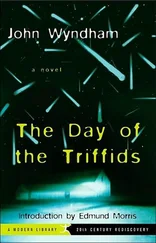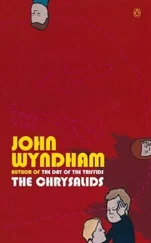John Wyndham - The Midwich Cuckoos
Здесь есть возможность читать онлайн «John Wyndham - The Midwich Cuckoos» весь текст электронной книги совершенно бесплатно (целиком полную версию без сокращений). В некоторых случаях можно слушать аудио, скачать через торрент в формате fb2 и присутствует краткое содержание. Жанр: Фантастика и фэнтези, на английском языке. Описание произведения, (предисловие) а так же отзывы посетителей доступны на портале библиотеки ЛибКат.
- Название:The Midwich Cuckoos
- Автор:
- Жанр:
- Год:неизвестен
- ISBN:нет данных
- Рейтинг книги:4 / 5. Голосов: 2
-
Избранное:Добавить в избранное
- Отзывы:
-
Ваша оценка:
- 80
- 1
- 2
- 3
- 4
- 5
The Midwich Cuckoos: краткое содержание, описание и аннотация
Предлагаем к чтению аннотацию, описание, краткое содержание или предисловие (зависит от того, что написал сам автор книги «The Midwich Cuckoos»). Если вы не нашли необходимую информацию о книге — напишите в комментариях, мы постараемся отыскать её.
The Midwich Cuckoos — читать онлайн бесплатно полную книгу (весь текст) целиком
Ниже представлен текст книги, разбитый по страницам. Система сохранения места последней прочитанной страницы, позволяет с удобством читать онлайн бесплатно книгу «The Midwich Cuckoos», без необходимости каждый раз заново искать на чём Вы остановились. Поставьте закладку, и сможете в любой момент перейти на страницу, на которой закончили чтение.
Интервал:
Закладка:
'So what will you do? We are very likely safe for a time while you talk about it. The more primitive of you, your masses, will let their instincts lead them – we saw the pattern in the village last night – they will want to hunt us down, and destroy us. Your more liberal, responsibly-minded, and religious people will be greatly troubled over the ethical position. Opposed to any form of drastic action at all, you will have your true idealists – and also your sham idealists: the quite large number of people who profess ideals as a form of premium for other-life insurance, and are content to lay up slavery and destitution for their descendants so long as they are enabled to produce personal copybooks of elevated views at the gate of heaven.
'Then, too, with your Government of the Right reluctantly driven to consider drastic action against us, your politicians of the Left will see a chance of party capital, and possible dismissal of the Government. They will defend our rights as a threatened minority, and children, at that. Their leaders will glow with righteousness on our behalf. They will claim, without referendum, to be representing justice, compassion, and the great heart of the people. Then it will occur to some of them that there really is a serious problem, and that if they were to force an election there would very likely be a split between the promoters of the party's official Warm-heart policy, and the rank and file whose misgivings about us will make them a Cold-feet faction; so the display of abstract righteousness, and the plugging of well-tested, best-selling virtues will diminish.'
'You don't appear to think very highly of our institutions,' Bernard put in. The girl shrugged.
'As a securely dominant species you could afford to lose touch with reality, and amuse yourselves with abstractions,' she replied. Then she went on: 'While these people are wrangling, it will come home to a lot of them that the problem of dealing with a more advanced species than themselves is not going to be easy, and will become less easy with procrastination. There may be practical attempts to deal with us. But we have shown last night what is going to happen to soldiers if they are sent against us. If you send aircraft, they will crash. Very well then, you will think of artillery, as the Russians did, or of guided missiles whose electronics we cannot affect. But if you send them, you won't be able to kill only us, you will have to kill all the people in the village as well – it would take you a long time even to contemplate such an action, and if it were carried out, what government in this country could survive such a massacre of innocents on the grounds of expediency? Not only would the party that sanctioned it be finished for good, but, if they were successful in removing the danger, the leaders could then be safely lynched, by way of atonement and expiation.'
She stopped speaking, and the boy took up:
'The details may vary, but something of the sort will become inevitable as the threat of our existence is more widely understood. You might easily have a curious epoch when both parties are fighting to keep out of office rather than be the one that has to take action against us.' He paused, looking out thoughtfully across the fields for some moments, then he added:
'Well, there it is. Neither you, nor we, have wishes that count in the matter – or should one say that we both have been given the same wish – to survive? We are all, you see, toys of the life force. It made you numerically strong, but mentally undeveloped; it made us mentally strong, but physically weak: now it has set us at one another, to see what will happen. A cruel sport, perhaps, from both our points of view, but a very, very old one. Cruelty is as old as life itself. There is some improvement: humour and compassion are the most important of human inventions; but they are not very firmly established yet, though promising well.' He paused, and smiled. 'A real bit of Zellaby, that – our first teacher,' he put in, and then went on. 'But the life force is a great deal stronger than they are; and it won't be denied its blood-sports.
'However, it has seemed possible to us that the serious stage of the combat might at least be postponed. And that is what we want to talk to you about...'
Chapter 20. Ultimatum
'This,' Zellaby said reprovingly, to a golden-eyed girl who was sitting on the branch of a tree beside the path, 'this is a quite uncalled-for circumscription of my movements. You know perfectly well that I always take an afternoon stroll, and that I always return for tea. Tyranny easily becomes a very bad habit. Besides, you've got my wife as a hostage.'
The Child appeared to think it over, and presently pushed a large bullseye into one cheek.
'All right, Mr Zellaby,' she said.
Zellaby advanced a foot. This time it passed unobstructedly over an invisible barrier that had stopped it before.
'Thank you, my dear,' he said, with a polite inclination of his head. 'Come along, Gayford.'
We passed on into the woods, leaving the guardian of the path idly swinging her legs, and crunching her bullseye.
'A very interesting aspect of this affair is the demarcations between the individual and the collective,' Zellaby remarked. 'I've really made precious little progress in determining it. The Child's appreciation of her sweet is indubitably individual, it could scarcely be other; but her permission for us to go on was collective, as was the influence that stopped us. And since the mind is collective, what about the sensations it receives? Are the rest of the Children vicariously enjoying her bullseye, too? It would appear not, yet they must be aware of it, and perhaps of its flavour. A similar problem arises when I show them my films and lecture to them. In theory, if I had two of them only as my audience, all of them would share the experience – that's the way they learn their lessons, as I told you – but in practice I always have a full house when I go up to The Grange. As far as I can understand it, when I show a film they could get it from one representative of each sex, but, presumably, in the transmission of visual sensation something is lost, for they all very much prefer to see it with their own eyes. It is difficult to get them to talk about it much, but it does appear that individual experience of a picture is more satisfactory to them as, one must suppose, is individual experience of a bullseye. It is a reflection that sets off a whole train of questions.'
'I can believe that,' I agreed, 'but they are post-graduate questions. As far as I am concerned, the basic problem of their presence here at all gives me quite enough to be going on with.'
'Oh,' said Zellaby, 'I don't think there is much that's novel about that. Our presence here at all raises the same problem.'
'I don't see that. We evolved here – but where did the Children come from?'
'Aren't you taking a theory for an established fact, my dear fellow? It is widely supposed that we evolved here, and to support that supposition it is supposed that there once existed a creature who was the ancestor of ourselves, and of the apes – what our grandfathers used to call "the missing link". But there has never been any satisfactory proof that such a creature existed. And the missing link, why, bless my soul, the whole proposition is riddled with missing links – if that is an acceptable metaphor. Can you see the whole diversity of races evolving from this one link? I can't, however hard I try. Nor, at a later stage, can I see a nomadic creature segregating the strains which would give rise to such fixed and distinctive characteristics of race. On islands it is understandable, but not on the great land-masses. At first sight, climate might have some effect – until one considers the Mongolian characteristics apparently indigenous from the equator to the North Pole. Think, too, of the innumerable intermediary types there would have to be, and then of the few poor relics we have been able to find. Think of the number of generations we should have to go back to trace the blacks, the whites, the reds, and the yellows to a common ancestor, and consider that where there should be innumerable traces of this development left by millions of evolving ancestors there is practically nothing but a great blank. Why, we know more about the age of reptiles than we do about the age of supposedly evolving man. We had a complete evolutionary tree for the horse many years ago. If it were possible to do the same for man we should have done it by now. But what do we have? Just a few, remarkably few, isolated specimens. Nobody knows where, or if, they fit into an evolutionary picture because there is no picture – only supposition. The specimens are as unattached to us as we are to the Children...'
Читать дальшеИнтервал:
Закладка:
Похожие книги на «The Midwich Cuckoos»
Представляем Вашему вниманию похожие книги на «The Midwich Cuckoos» списком для выбора. Мы отобрали схожую по названию и смыслу литературу в надежде предоставить читателям больше вариантов отыскать новые, интересные, ещё непрочитанные произведения.
Обсуждение, отзывы о книге «The Midwich Cuckoos» и просто собственные мнения читателей. Оставьте ваши комментарии, напишите, что Вы думаете о произведении, его смысле или главных героях. Укажите что конкретно понравилось, а что нет, и почему Вы так считаете.












